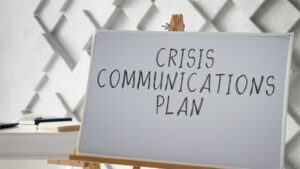Crisis communication
If we believe the words of lecturer and author of numerous books on crisis communication W. Timothy Coombs, no organization is immune to crisis . In other words, the question is not whether a crisis will ever occur, but how you will react to it and how prepared you are for quality crisis communication . And let’s make it clear right at the beginning – one bad management of crisis communication can have fatal consequences for a reputation that, as a rule, has been built up for many years. That is why we are dedicating this blog to the important topic of crisis communication, and in addition to a few general rules of crisis communication strategy, we also reveal some tips and tricks .
Is every problem a crisis?
In a word: no. The crisis refers to major incidents in which people’s safety is threatened, and the whole event is accompanied by negative publicity and great media interest. We can say that a crisis is an unplanned and unwanted period of limited duration with unforeseen possible outcomes . The causes of the crisis can be different and are divided into internal (relations in the company, bad product, bad business decisions) and external (global crisis such as a pandemic, changes in legal regulations, etc.). In optimistic “scenarios”, crisis situations can also be characterized as an opportunity to increase positive public perception, but since these are mostly situations with serious consequences, we are more inclined to say that the way you manage a crisis is an excellent indicator of how much you think about your behavior, the decisions you make, how much you question your business steps, and how much you truly want to be better at what you do. If we may express ourselves poetically, we will rephrase the famous sentence: tell me how you deal with a crisis and I will tell you what kind of person you are .
Crisis communication rules
It has been scientifically proven that stress (especially severe and sudden stress) can have a paralyzing effect and that people find it difficult to make rational and quality decisions in stressful situations. That is why it is important to determine in advance the steps and plan that should be automatically followed in the event of a crisis situation, because a correct and timely reaction (the first reaction must be within one hour of the event) is extremely important.
Preventive measures – preparation of a communication plan. On time.
This plan is developed BEFORE a crisis situation. It is a kind of manual that guides everyone involved in crisis communication. PR agencies that offer crisis communication services in their portfolio develop this plan into detailed instructions that greatly reduce the possibility of missteps in communication. A good plan requires an in-depth analysis of all business factors, as well as knowledge of the stakeholders in the entire business process. Experts recommend that the crisis communication plan be regularly revised to better monitor market developments. The first step is the simulation of a crisis situation that all departments of the company must go through.

A crisis has struck, what now?
Gathering a crisis team
A crisis team brings together several people who will manage the crisis. They need to be well connected and informed about all events. Among them must certainly be a person who will represent the organization , or make statements. For the best possible preparation in media appearances, our agency provides media trainings and so-called simulations of crisis situations where people prepare for various challenges and situations they may face in crisis communication.
Correct and timely communication on all channels
When a crisis situation occurs, the first thing to do is to take care of all stakeholders in the event , and then to carry out quality internal communication , i.e. Explain the event and protocols to employees and colleagues. The first communication must be directed towards those directly affected by the crisis. The crisis team must provide answers to three important questions that will be conveyed to the public. These are: What happened? What are we doing now to repair the damage? What will we change in the future to prevent similar situations? In the next 24 hours, we expect the greatest media and public interest in the crisis event, so it is extremely important that accurate information is available on all our digital platforms and channels (website, social networks, etc.). In this most critical period, it is important to define the steps to resolve the crisis, as well as everything that is planned to be undertaken to remedy its consequences, and the activities that we will undertake to prevent such or similar crises in the future.
Analyze what you did and whether you could have done it better or differently.
As the name suggests, public relations are based on the interaction between an organization and its audiences (the public), so, as in any relationship, it is impossible to predict every reaction. That is why a quality analysis of the work done (post-crisis analysis) is important in order to identify any shortcomings or identify better responses to the situation. Of course, after the analysis, time should be taken to update the crisis plan we mentioned at the beginning.
Our recommendations
As a public relations agency whose expertise and area of activity is precisely crisis communication , in addition to all of the above, we must emphasize some of our experiences. The golden rule of any crisis communication is the truth, the truth now and the truth immediately . Namely, any fine tuning of an event can backfire, and in multiple ways. Furthermore, don’t forget the power of an apology and humanity . People make mistakes. Companies make mistakes. When an incident occurs, especially a serious incident in which someone is injured, remember that the most important thing is to approach it humanly and apologize, express condolences, and show concern . And finally, make business decisions every day in a way that prevents possible crisis situations, because that is the best indicator that you are taking your business seriously.
Your experiences?
Pages have been written on this topic, and we could say much more. Therefore, if you are interested in learning more about this topic or would like to share your experiences, please contact us.







